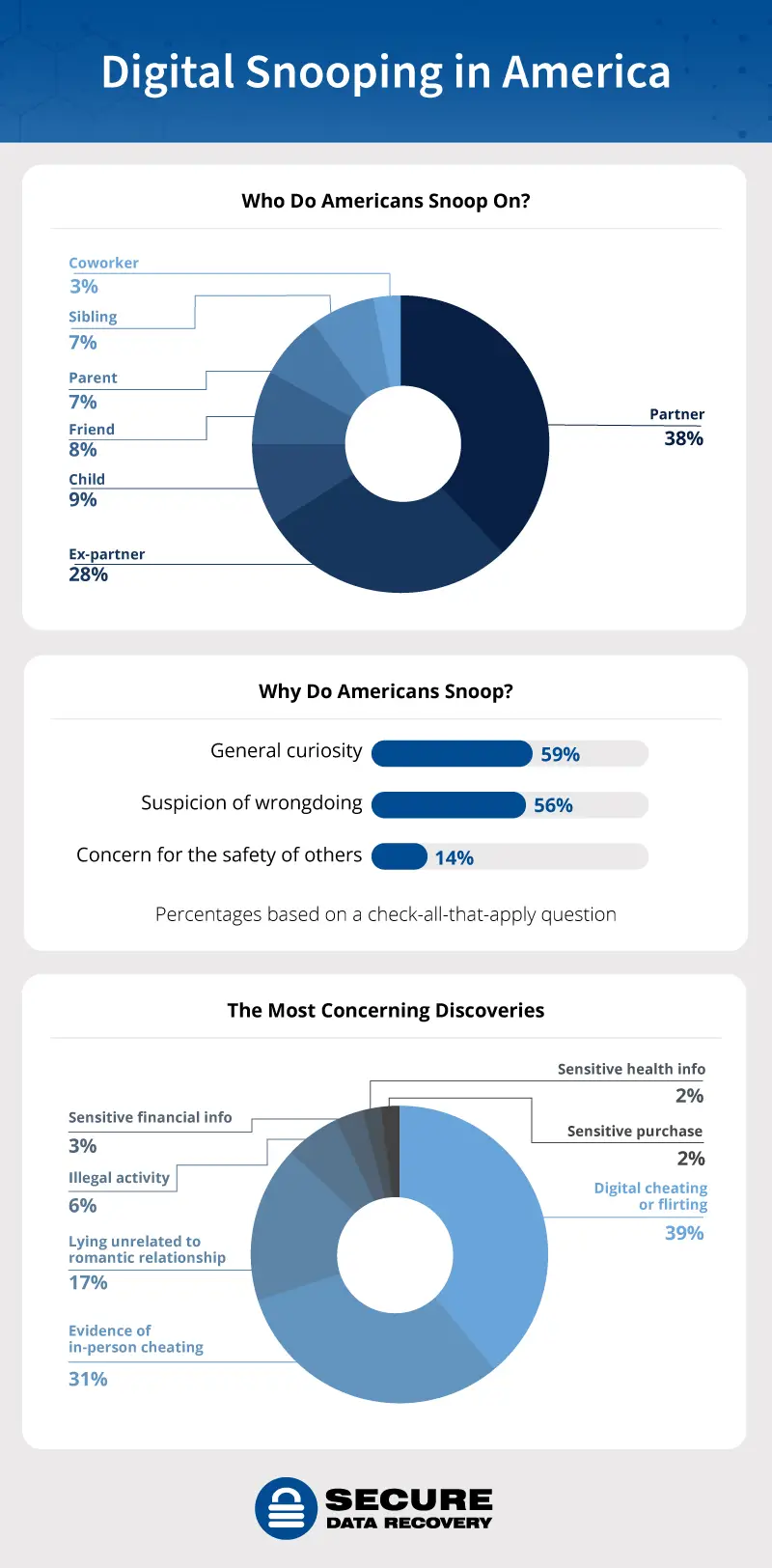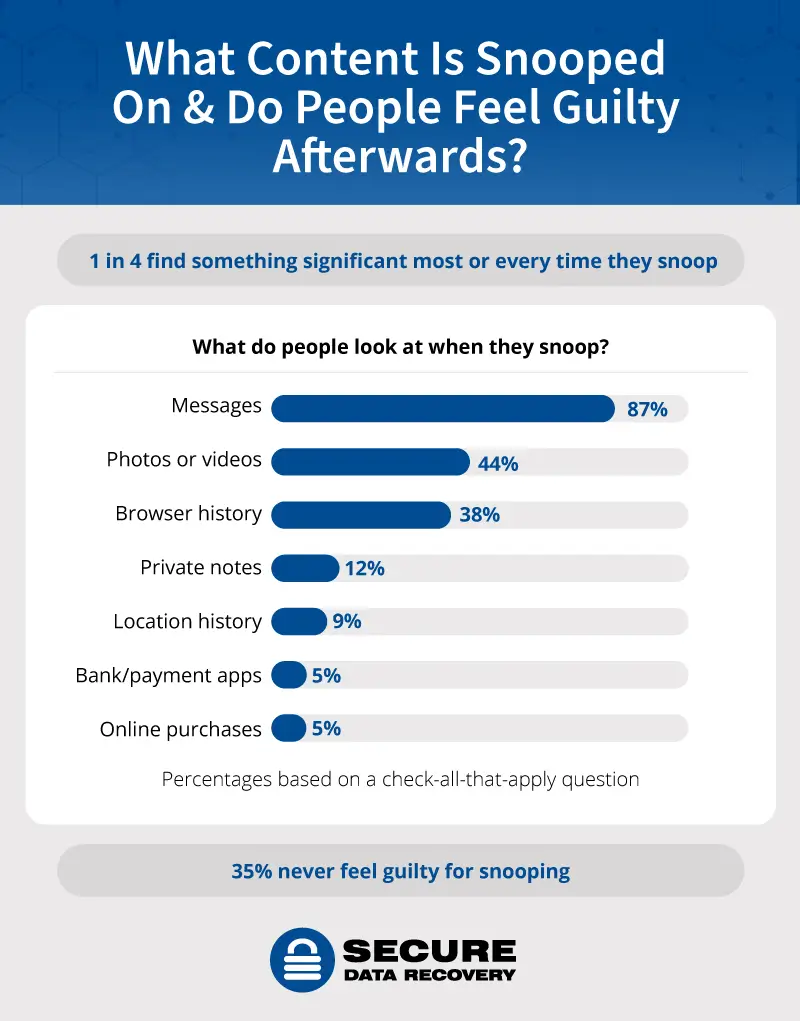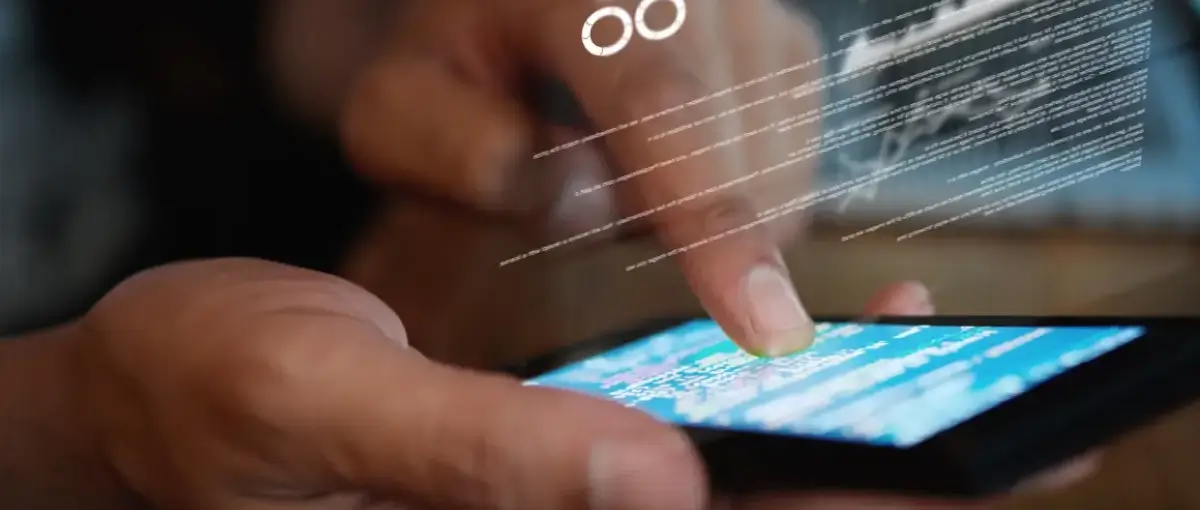So much of our lives are lived online, from our work and personal communication to our entertainment and social lives. As a result, our digital devices have become a treasure trove of information about us, revealing details about everything from our financial habits to our personal relationships.
Even if you don’t overshare personal information online, an abundance of data sits in our phones well within reach of those around us. So, it’s no surprise that many are tempted to snoop. Digital snooping refers to the act of accessing someone’s information on a digital device without their permission. This practice, often carried out by those closest to us, is not intended to steal information, but rather to gain a deeper understanding of the individual beyond their surface-level persona.
Secure Data Recovery surveyed Americans about their experiences with snooping to gain a better understanding of when and why people snoop and in which types of relationships it is most common.
Key findings
- A large majority (82%) have snooped through someone else’s device.
- A surprising 1 in 4 snoopers have found something significant most or every time they snoop.
- Baby boomers are most likely not to regret snooping.
- The majority of respondents (81%) have never been caught snooping.
Majority of Americans are digital snoops — here’s why
As technology becomes an increasingly pervasive part of life, it’s not surprising that people often leave digital trails that others can follow; if only they are able to obtain something as simple as a password. Our data shows that a significant majority of Americans (82%) have snooped through someone else’s device at some point.
However, there are notable differences in snooping behaviors between generations and genders. Millennials (85%), who grew up during the rise of everyday technology, are more likely to snoop than Gen Z (77%). Meanwhile, women (88%) are more likely than men (77%) to snoop.
The motivations for snooping are also quite telling. While general curiosity (59%) is the most commonly cited reason for snooping, a significant portion of Americans are driven by suspicions of wrongdoing (56%). Perhaps the ease and accessibility of digital snooping is what drives people to engage in this behavior. The ubiquity of digital devices and the vast amount of information stored on them can make it tempting for individuals to seek out the private lives of those around them, all without having to consider the reasons for their curiosity.
When it comes to the content that people look for when snooping, messages (87%) are the most frequently sought after. Because “messages” include text messages, emails, social media DMs, and more, this suggests that people are most interested in learning about the relationships of those closest to them.

People are most likely to snoop on their partners
The ubiquity of snooping is even more significant when it comes to romantic relationships, with a staggering 66% of individuals admitting to snooping through their partner’s or ex-partner’s device. This signifies that trust issues and insecurities may be pervasive in romantic relationships, and digital devices have become an easy tool to access for investigating a partner’s activities.
What’s more, over half of those who snoop (53%), report finding something incriminating or concerning from snooping, which leads us to understand that people are searching for information they believe may validate their suspicions. In fact, the vast majority (70%) of those who have found something incriminating reported evidence of cheating or inappropriate flirting, whether it’s digital or in person.
1 in 3 have no regrets
Clearly, snooping is a prevalent behavior among Americans, with the majority having snooped at some point in their lives. With that many people snooping, you’d think they’d be easy to catch, but our data finds that a large majority (81%) have never been caught snooping.
Additionally, 1 in 4 find something significant most or every time they snoop, which suggests that individuals may be motivated to snoop due to previous success in uncovering information. However, 30% never find anything significant, which indicates that the motives for snooping may not always be justified.
Now, do snoopers feel regret? Well, over a third report not feeling any regret or remorse after snooping, which indicates that they may feel rational in their actions or are comfortable with snooping as a behavior.
On the other hand, 1 in 10 people report never snooping because they believe it’s not appropriate. Another 10% say they haven’t snooped simply because they haven’t had a reason to. This data suggests that it’s actually quite rare to find someone who refrains from snooping purely on principle, as the majority either have snooped or may snoop is presented with a reason.
When it comes to gender and generational differences, women are less likely to feel regret than men over snooping. We were also extremely surprised to find that baby boomers are the most likely to not regret snooping, suggesting that age and experience may play a role in shaping attitudes toward the behavior.
Finally, 31% of Americans have confronted someone when they suspect they are being snooped on, with women being more likely to do so. While snooping is a common behavior, it can also lead to conflict and confrontation in relationships.

Conclusion
As we continue to rely on digital devices and online communication, it becomes increasingly important to be mindful of our digital privacy and the boundaries of those around us. Whether it’s setting clear expectations with a partner or taking the steps to secure our own devices, it’s crucial that we recognize the impact of digital snooping on relationships and work toward building trust and respect in our everyday actions — digital or in-person.
By prioritizing the security of your information and establishing boundaries, you can maintain your digital privacy and foster healthy relationships built on trust. Digital privacy goes beyond creating strong passwords; it requires a comprehensive approach to protect your personal data from being accessed, either intentionally or unintentionally, by those close to you.
In the event that you experience data loss or compromised information, the expertise of Secure Data Recovery is invaluable. As a leading provider of data recovery services, we specialize in restoring your valuable information and ensuring your private data is recovered effectively. By partnering with us, you can take proactive steps to protect your digital privacy and have peace of mind in case of data-related emergencies.
Methodology
We surveyed 1,003 people across the United States on the Prolific online research platform, asking about their digital snooping habits and opinions. Of our respondents, 48% identified as female, 50% as male, and 2% nonbinary. Respondents’ ages ranged from 18 to 76 years old; 19% Gen Z, 51% millennials, 19% Gen X, and 11% baby boomers.







